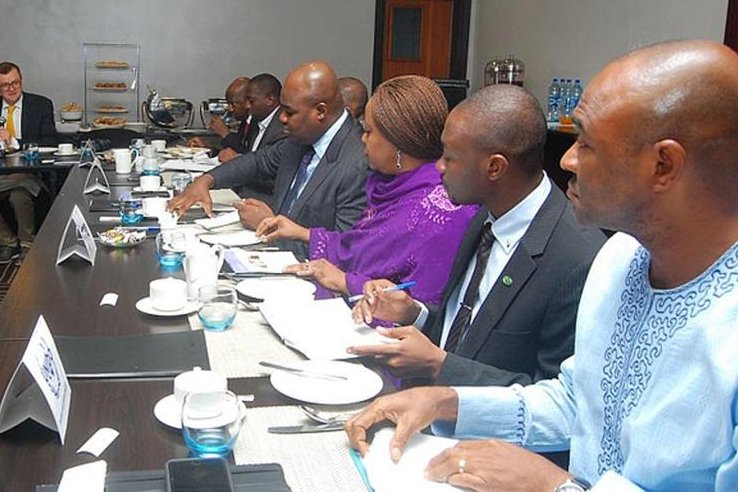Nigerian leaders discuss ways to diversify the economy away from oil with members of a U.N. agency. Photo courtesy of the U.N. Industrial Development Organization
July 19 (UPI) -- Developing parts of the Nigerian economy outside the oil sector could help make the country more competitive and attract investments, a U.N. agency said.
The U.N. Industrial Development Organization started a program to help Nigeria steer its economy away from oil. The Nigerian economy slipped into recession last year under the strains of lower oil prices and a decline in oil production. In April, the International Monetary Fund said only minor growth was expected this year, with most of that coming from recovery in the energy market.
Crude oil prices remain subdued, however. The price for Brent crude oil, the global benchmark, is 10 percent lower than it was at the start of the year. UNIDO said that Nigeria was once one of Africa's bright spots, but its economy has been hit "badly" by crude oil prices and it was now working with the government to promote non-oil sectors.
"With the proper regulatory incentive framework and the right training tools for entrepreneurs in the non-oil sector, the Nigerian economy could take a step forward in industrial upgrading and technological innovation to make the nation a more competitive brand on the continent and the world at large," Adebisi Olumodimu, a Nigerian director for UNIDO, said in a statement.
UNIDO said it would work to develop small- and medium-sized enterprises tied to the agricultural and automotive sectors.
Nigeria is a member of the Organization of Petroleum Exporting Countries and is exempt from a multilateral agreement to curb crude oil production. The OPEC-led effort was designed to ease some of the supply-side strains that put negative pressure on crude oil prices last year. The effort, however, is offset by production gains from Nigeria, OPEC-member Libya, which is also exempt, and the United States.
A Shell subsidiary in Nigeria, however, declared force majeure, a contractual condition related to circumstances beyond the control of the parties involved, over exports. That signals a disruption in the output from Nigeria.
OPEC Secretary General Mohammad Barkindo met last week with Nigerian Finance Minister Kemi Adeosun. A committee monitoring the production agreement meets next week in Russia to review its impact.















